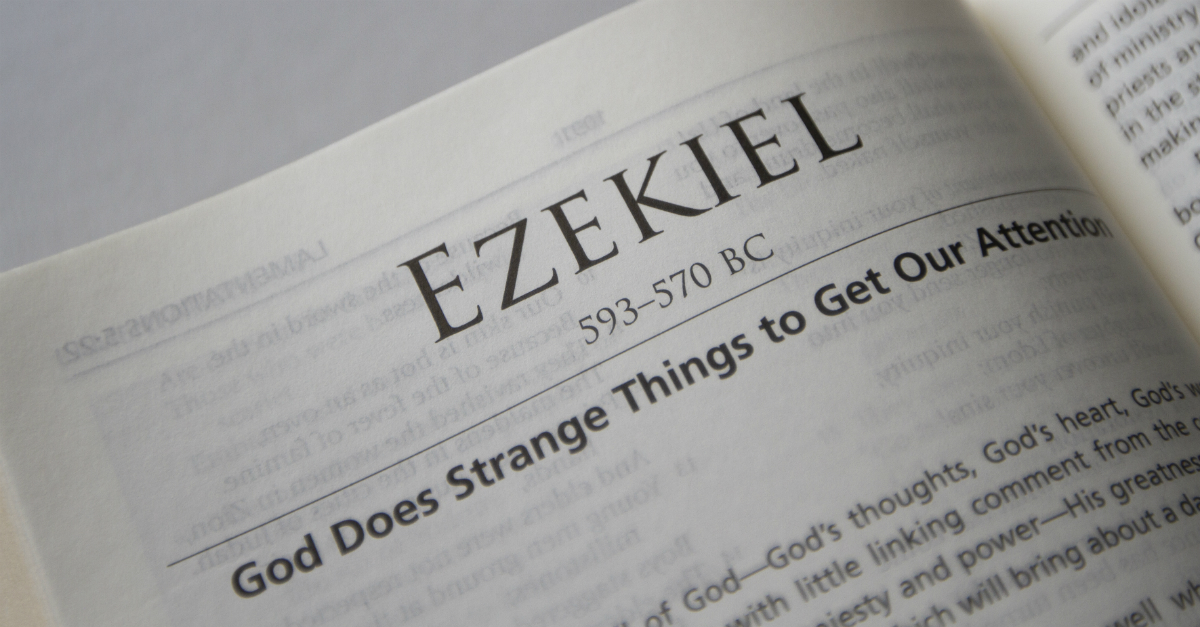What Does Ezekiel 25:17 Really Mean for Us?

“I will execute great vengeance on them with wrathful rebukes; and they will know that I am the Lord when I lay My vengeance on them.” (Ezekiel 25:17; NASB Translation)
There are a handful of Bible verses that most Christians probably know by heart.
-“I can do all this through him who gives me strength.” (Philippians 4:13)
-“for all have sinned and fall short of the glory of God.” (Romans 3:23)
-“Trust in the Lord with all your heart and lean not on your own understanding; in all your ways submit to him, and he will make your paths straight.” (Proverbs 3:5-6)
-“For God so loved the world that he gave his one and only Son, that whoever believes in him shall not perish but have eternal life.” (John 3:16)
Short, iconic, and easy to memorize, these are just a few foundational verses to the Christian faith that are often seen printed on bumper stickers or t-shirts or showcased on Twitter feeds.
Ezekiel 25:17, however, is one verse that most Christ-followers and Bible readers may draw a blank on; and yet, it’s one of the most popular and highly searched Bible verses in pop culture.
Why Is Ezekiel 25:17 So Popular?
Ironically, it’s the movie buffs that have committed Ezekiel 25:17 to memory and elevated it to the top of most online search engines.
That’s because a version of Ezekiel 25:17 is famously quoted by hitman Jules Winfield, played by Samuel L. Jackson, in Quentin Tarantino’s 1994 cult classic, Pulp Fiction.
In one of Quentin Tarantino’s first feature films, the character Jules Winfield recites a modified version of Ezekiel 25:17 right before he shoots and kills one of his intended targets. According to Jules, he’s been saying it for years.
But how does the famous movie monologue compare to the actual verse that inspired it?
In Pulp Fiction Jules says,
“The path of the righteous man is beset on all sides by the inequities of the selfish and the tyranny of evil men. Blessed is he who, in the name of charity and good will, shepherds the weak through the valley of the darkness, for he is truly his brother’s keeper and the finder of lost children and I will strike down upon thee with great vengeance and furious anger those who attempt to poison and destroy my brothers and you will know I am the Lord when I lay my vengeance upon you!”
Ezekiel 25:17, however, says,
I will execute great vengeance on them with wrathful rebukes; and they will know that I am the Lord when I lay My vengeance on them. (Ezekiel 25:17)
It’s safe to say that Pulp Fiction definitely took some liberties.
But what does the real, biblical Ezekiel 25:17 actually mean? Why is the Pulp Fiction version so different?
And why is so important for believers to know what the Bible really has to say?
Understanding the Context of the Book of Ezekiel
The book of Ezekiel was written by the prophet Ezekiel, who had ministered to God’s people from 592 B.C. to 570 B.C. and warned of the eventual destruction of Jerusalem at the hands of Babylon in 586 B.C.
Ezekiel himself wrote most of his message from captivity as one of 10,000 Jews taken by King Nebuchadnezzar in 597 B.C.
In fact, Nebuchadnezzar had previously carried off a number of high-level Jewish hostages in his first invasion of Judah in 605 B.C. Among this first group of captives was the prophet Daniel, who resided in the palaces of Babylon and ministered to the king himself, while Ezekiel lived in the countryside.
For years, God warned the people of Israel and Judah, through prophets such as Isaiah and Jeremiah, that if they didn’t turn from their idolatry, He would discipline them for their disobedience and unfaithfulness. Unfortunately, the people of Israel did not heed the warning and were taken captive by the Babylonians as a result.
It would take 70 years in captivity for God’s message to finally get through and the hearts of Israel to return to God.
This was the very idea behind Jeremiah’s most quoted verse: “’for I know the plans I have for you,’ declares the Lord, ‘plans to prosper you and not to harm you, plans to give you hope and a future.’” (Jeremiah 29:11)
As it was written in the Proverbs, “my son, do not reject the discipline of the Lord or loathe His reproof, for whom the Lord loves He reproves, even as a father corrects the son in whom he delights.” (Proverbs 3:11-12)
The captivity and exile of Israel were all part of God’s plan for His people, who He had chosen to discipline because of His love. By the time the captives of Israel returned to Jerusalem, the people had been cured of their idolatry. From that moment on, the children of Israel would look to God and God alone. God’s plan had worked.
In fact, one of the recurring themes of the book of Ezekiel can be found in the phrase, “and they will know that I am the Lord,” which is repeated on several occasions.
Not only was this a message to the people of Israel, it was a warning to the enemies and surrounding nations who wanted to destroy Israel.
God Disciplines, but He Also Protects
God may discipline His children, but He also defends and protects the ones He loves.
This is where Ezekiel 25:17 comes into play.
Where most of Ezekiel’s writings are directed to the people of Israel, chapters 25 through 32 are written to the enemies of Israel, warning them of God’s coming judgment.
Ezekiel 25 specifically looks to the nations of Moab (Ezekiel 25:8-11), Edom (Ezekiel 25:12-14), and Philistia (Ezekiel 25:15-17) for their treatment of Israel.
So when Ezekiel writes, “I (the Lord) will execute great vengeance on them with wrathful rebukes; and they will know that I am the Lord when I lay My vengeance on them.” (Ezekiel 25:17), he is writing specifically about the Philistines, who had been a major adversary of Israel going all the way back to the time of Samson and King David.
The point here is that God remembers those who wrong His people and promises here to avenge Himself on one of Israel’s greatest tormentors.
It is not man’s vengeance that Ezekiel highlights, but God’s, specifically targeted at the Philistines. And by His miracles, all nations will see and know that He alone is God!
How Does Pulp Fiction Misinterpret Ezekiel 25:17?
By his own admission, Quentin Tarantino modified Ezekiel 25:17 to make Jules’ killer mantra sound more intimidating. It wouldn’t be the first time that a movie or fictional character altered, misinterpreted, or misappropriated a passage of Scripture. It happens in real life, too.
And yes, the Bible has a few things to say about adding to, twisting, or changing the meaning of Scripture (2 Timothy 3:16-17, Deuteronomy 4:2, Proverbs 30:5-6).
In this instance, however, Pulp Fiction’s Jules Winfield is portrayed as a violent, spiritually-minded, and entirely fictional character who frequently contemplates social norms and the deeper meaning of mercy, redemption, and the condition of his own soul.
Interestingly enough, Jules does eventually choose to walk away from his life as a hitman to “walk the earth,” transformed by what he believes was “divine intervention.” And while his “transformation” isn’t necessarily aligned with the biblical concept of redemption, the character does address several biblical themes through his actions and dialogue.
His famous slogan is a patchwork of several prominent Bible verses loosely sewn together to form the character’s mantra.
For instance, the line, “the path of the righteous man is beset on all sides by the inequities of the selfish and the tyranny of evil men” is derived from verses like Proverbs 2:20, Proverbs 8:20, and Proverbs 11:5, which says, “the righteousness of the blameless makes their paths straight, but the wicked are brought down by their own wickedness.”
“Shepherding the weak through the valley of darkness” no doubt draws from the Shepherd’s Psalm, Psalms 23, and even Ezekiel 34, where Ezekiel prophesies against the “shepherds” and spiritual leaders of Israel for failing God’s people.
The term “brother’s keeper” comes from Genesis 4:9 in which Cain responds to the Lord, asking, “am I my brother’s keeper?” after he had murdered his brother Abel.
Referencing “lost children” could be a connection to the Parable of the Lost Sheep (Luke 15) and other passages of Scripture where God refers to His children as “lost” sheep in need of rescue (Jeremiah 50:6, Matthew 15:24).
Even the quoting of Ezekiel 25:17 isn’t a faithful representation of the biblical text in that it adds extra words.
So, unfortunately, while Jules Winfield’s quote does reference parts of Scripture, the character ultimately conflates and confuses the meaning of the passages he has cobbled together.
What Do Different Bible Translations Say in Ezekiel 25:17?
"I will carry out great vengeance on them and punish them in my wrath. Then they will know that I am the Lord, when I take vengeance on them.'" (NIV Translation)
"I will execute great vengeance on them with wrathful rebukes. Then they will know that I am the Lord, when I lay my vengeance upon them.'" (ESV Translation)
"I will execute terrible vengeance against them to punish them for what they have done. And when I have inflicted my revenge, they will know that I am the Lord.'" (NLT Translation)
God, the Master, says: ‘Because the Philistines were so spitefully vengeful—all those centuries of stored-up malice!—and did their best to destroy Judah, therefore I, God, the Master, will oppose the Philistines and cut down the Cretans and anybody else left along the seacoast. Huge acts of vengeance, massive punishments! When I bring vengeance, they’ll realize that I am God.” (Ezekiel 25:15-17, The Message)
What Christians Need to Remember About God’s Vengeance
While Pulp Fiction references vengeance, Ezekiel 25:17 is quoted as a justification for man’s violence, not God’s.
The Bible, however, is clear that vengeance belongs to the Lord and that He alone is judge.
It is written:
- “And he judges the world with righteousness; he judges the peoples with uprightness.” (Psalms 9:8)
- “I will punish the world for its evil, and the wicked for their iniquity; I will put an end to the pomp of the arrogant, and lay low the pompous pride of the ruthless.” (Isaiah 13:11)
- “Beloved, never avenge yourselves, but leave it to the wrath of God, for it is written, ‘Vengeance is mine, I will repay, says the Lord.’” (Romans 12:19)
- “You shall not take vengeance or bear a grudge against the sons of your own people, but you shall love your neighbor as yourself: I am the Lord.” (Leviticus 19:18)
- “See that no one repays anyone evil for evil, but always seek to do good to one another and to everyone.” (1 Thessalonians 5:15)
The important thing to remember from all of these verses is that God alone is just, and He alone has the right to judge. He is the good shepherd responsible for disciplining and defending His sheep. Vengeance is His, never ours.
So when movie buffs recite Jules Winfield’s monologue or tattoo Ezekiel 25:17 onto their forearms, there’s a pretty good chance they aren’t really quoting Scripture. They’re quoting Pulp Fiction, and yes, there’s a big difference—one that Christians should definitely be aware of!
Photo Credit: ©GettyImages/diego_cervo

This article is part of our larger resource library of popular Bible verse phrases and quotes. We want to provide easy to read articles that answer your questions about the meaning, origin, and history of specific verses within Scripture's context. It is our hope that these will help you better understand the meaning and purpose of God's Word in relation to your life today.
"Be Still and Know that I Am God"
"Pray Without Ceasing"
"Fearfully and Wonderfully Made"
"All Things Work Together for Good"
"Do Not Fear"
Originally published August 07, 2020.






